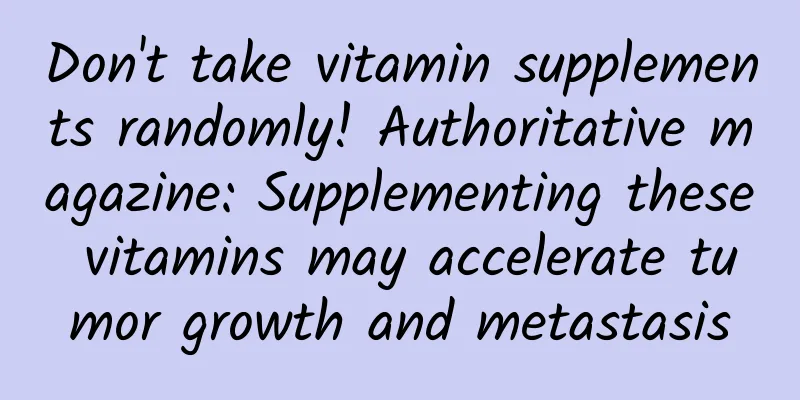Don't take vitamin supplements randomly! Authoritative magazine: Supplementing these vitamins may accelerate tumor growth and metastasis

|
Vitamin C is an important water-soluble vitamin. Early studies have shown that vitamin C has many benefits for human health, including the immune system, antioxidant effects, cardiovascular health, etc. As an antioxidant, vitamin C is often added to dietary supplements to neutralize free radicals and reduce oxidative stress damage to cells and tissues. However, too much vitamin C is not necessarily better, and high doses may be harmful to your health. Recently, researchers from Karolinska Institutet in Sweden, Zhengzhou University in China and Peking University published a research paper titled "Antioxidants stimulate BACH1-dependent tumor angiogenesis" in the Journal of Clinical Investigation "JCI". Previous studies by the researchers have shown that antioxidants such as vitamins C and E can stabilize the BACH1 protein, which can accelerate the growth and spread of lung cancer. This protein becomes activated when free radical levels in the body drop, which can happen when additional antioxidants are introduced into the diet, or when spontaneous mutations in tumor cells activate endogenous antioxidants. In the study, the researchers analyzed mice with lung cancer and mice implanted with human cancer cells, adding vitamin C, vitamin E and N-acetylcysteine to the mice's drinking water and food. The study found that as the dose of supplements increased and the antioxidant levels in the mice increased, blood vessels formed faster within lung cancer tumors. Increased blood vessel growth may accelerate tumor growth and metastasis. The results were true in both mice with lung cancer and mice implanted with human cancer cells. Antioxidants stabilize BACH1 and promote angiogenesis gene expression in lung cancer tumors In addition, the researchers analyzed lung cancer organoids from humans and mice grown in the laboratory and exposed to high doses of vitamin C, vitamin E and N-acetylcysteine. However, researchers say that although angiogenesis inhibitors are widely used in cancer treatment, their effectiveness varies and they may have serious side effects such as blood clots. Finally, the researchers also found that BACH1 is regulated in a similar manner to the protein hypoxia-inducible factor 1-alpha (HIF-1-α), whose expression is associated with angiogenesis-driven tumor growth and metastasis, suggesting that the two proteins act synergistically. The researchers emphasize that most people do not need additional antioxidant supplements, and there is no need to worry about antioxidants in common foods. In fact, excessive antioxidant supplementation may be harmful to cancer patients and those at higher risk of cancer. In summary, studies have shown that supplementing with antioxidants such as vitamins C and E may increase the formation of blood vessels within lung cancer tumors and accelerate tumor growth and metastasis. Next, the researchers plan to analyze specifically how levels of oxygen and free radicals regulate the BACH1 protein and will conduct similar studies on other forms of cancer, such as breast cancer, kidney cancer, and skin cancer. Paper link: |
<<: Is coconut oil healthier? Should you replace your homemade oil with coconut oil?
>>: Night Listening | Eating dinner earlier vs. later, the difference is so big!
Recommend
What is the best way to maintain the uterus?
The uterus is an important organ in the female bo...
Tumor markers elevated? Don’t panic! Here’s the truth!
Tumor markers elevated? Don’t panic! Here’s the t...
How many times should I check after cervical conization?
The follow-up items three months after cervical c...
What should I do if my breasts shrink after giving birth?
Breasts are the key to a woman's beauty. If a...
Effects of folic acid on the skin
Folic acid is an essential substance for the huma...
Are apple bananas genetically modified? What is the difference between apple bananas and ordinary bananas?
I saw a kind of banana that looks like an apple i...
How to get fungal vaginitis
Vaginal candidiasis is a relatively common gyneco...
Can I get pregnant if I ejaculate inside during my fertile period?
In order to make it easier for themselves to conc...
What medicine to take for cervicitis and pelvic inflammatory disease
Cervicitis and pelvic inflammatory disease are tw...
What are the benefits of taking a nap for girls
If girls take naps regularly, they can improve th...
What is the armpit temperature after ovulation?
Adult women need to experience an ovulation perio...
What to do if breast development is not good
Breasts are on the chest of both men and women, b...
Precautions for recovery of uterus after artificial abortion
Abortion is something that women do not want to f...
What impact will Kobe's death have on the NBA? How did Kobe's private helicopter crash?
I still can't believe that Kobe has passed aw...
What are the normal values of progesterone in pregnancy?
What are the normal values of progesterone in n...









